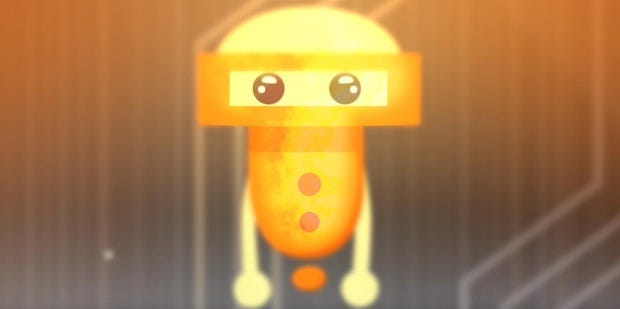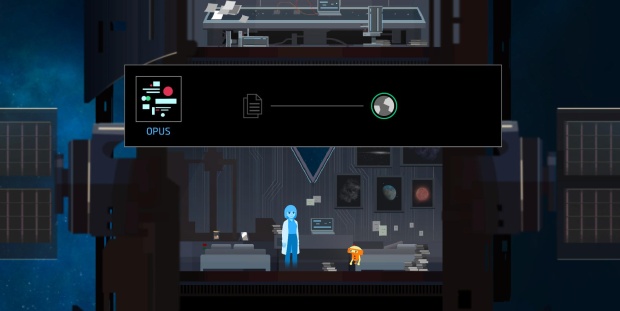Wot I Think: OPUS - The Day We Found Earth
A Strange Composition
OPUS [official site] is a peculiar little project, a strange smurge of ideas, some great, some poor, that results in what constantly feels like it should be a relaxing experience. I want to like it a lot more than I do. Here's wot I think.
The premise is thus: at some point in the future, Earth has become a mythical place believed to contain the potential DNA that could save the human race. A mission to locate Earth, costing trillions of spacebucks, is seemingly staffed by two scientists and a really badly programmed robot - they're scanning potential Earth candidates using a giant space telescope, painstakingly, one by one. You essentially play as the badly programmed robot, tasked with following the increasingly opaque instructions to locate particular solar systems in the vast spread of the twentieth galaxy they've searched, to see if they contain our blue-green home.
You activate the telescope, get the directions, then scan around an enormous spread of stars to find the ones you want to scan. These instructions start off as direct coordinates - 02,08 in the SERYUM.R sec, 180 deg N. of the [Q] Dark sec - and then become increasingly more vague. Leaving out some of the details, and then eventually ambiguously waving you toward a particular sec and telling you to go north of it. Scanning involves swinging the cursor (either by keyboard, or the very nice mouse controls) over the star you choose, then hitting Space. If there is any potential similarity it does a further scan of all the planets in that solar system, giving you percentage similarities to Earth. Anything over about 50% is considered significant, and you name the planet (if you want) and return to the station.
It's on the station that the game's story is told. It's a bollocky-bollock of a tale, with a very early twist whose 'reveal' is grindingly dragged out for the rest of the game as if it could be a surprise to anyone - something about the robot not being able to find his human chums but continuing to look for Earth anyway while whinging about it to a hologram. For some reason this metallic assistant has been designed to be as ill-informed (he doesn't know what solar flares are, for instance) and mawkishly emotional as possible, which seems an odd choice when spending so much money looking for a way to secure the future of humanity.
The result is a very, very simple puzzle mechanic (find a star by following loose directions) that is incessantly interrupted by near-pointless returns to the ship. Oftentimes there's not even a new narrative beat on these returns, making the slllloooooowwwww fading screens all the more annoying to sit through, when you've got three more stars to find in your current list of objectives. Added to those stars are other obscurities to discover, flagged by objects you find by clicking on scenery in the ever-growing number of rooms available on the ship.
This is a lot less interesting than it sounds, and very peculiarly, about a third of those obectives are unavailable in your first play through the game - you have to finish the whole game, then go back into it in a free-play mode set earlier in the story, and then look for them for literally no reason with no narrative results. In that first playthrough our robot friend says, "I'll have to look at that later," despite there being no pressing reason not to just let you do it at the time. Really odd.
But frustration is so often caused by liking something, at least in its early stages. If a game's just rubbish, it's rarely frustrating at any point. But in OPUS, there's something about scanning the stars that's calm and relaxing, especially the pleasant ambience, the plinky-plonky tones of scanning across fields of solar systems, and the victory of solving the puzzles as to the locations (although none are difficult).
It's being torn away from that gentle experience to be told yet again that a robot is sad about a thing that made the game grate for me. It would have been so lovely to see this puzzle mechanic embellished, for it to go a good deal deeper, to let you find five or six stars for every one, before being dragged back to the half-plot. And of course to let you actually play the full game the first time through, when there's no meaningful reason to go back once you're done.
OPUS is very cute, and while the story obviously borrows heavily from elsewhere, and while the core mechanic will feel familiar to fans of Mass Effect, it was almost a lovely idea. I'd love to play OPUS Remastered, with the ideas elaborated upon, the ship clicking given more purpose, and a greater focus on those ambient puzzles. This remains interestingly strange, but never quite interesting enough.
OPUS: The Day We Found Earth is out now for Windows and Mac.












